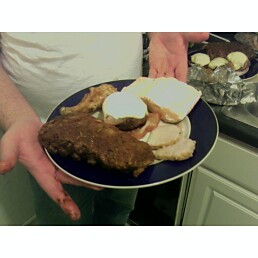This page entitled A New Manhattan Project lists each essay and also details the fundamental points about alternative energy, and why many have unrealistic expectations about it.
I know it's long, and there are a lot of links, but trust me-it's worth reading. One point that Steven makes that is often ignored in alternative energy discussions is the fact that electricity isn't an energy source. We use energy sources to MAKE electricity. So when you get all excited that your new Toyonda Pious is using less gas than a regular car, don't forget that this electricity has to be made somewhere. And half of our electricity is made from coal. If we switched to nuclear power it would make sense, but no one is seriously proposing that we build more nuke plants (which we should).
I happened upon the amusingly entitled blog The Only Republican in San Francisco. The author discusses a recent article from the Independent about a new study which points out that organic farming is in many cases worse for the environment than conventional methods, thanks to the relative inefficiencies of organic farming.
Good job hippie. Yet again another wonderful eco-friendly solution that exacerbates another environmental problem.
The latest one besides that is the ethanol situation. Ethanol is made primarily from corn, and the government recently set a goal of cutting gasoline consumption 20 percent by 2017, mainly by more than quadrupling production of ethanol and other alternative fuels.
Guess what happened so far? It's making corn more expensive. Guess what that means?
From Reuters-
Soaring U.S. demand for ethanol - produced from crops like maize and sugar cane - has sent corn prices to their highest level in a decade.
Mexicans are already feeling the impact. Tens of thousands took to the streets in January when the price of tortillas tripled to 15 pesos ($1.36) a kilogramme (2.2 pounds) - about 35 of the flat corn patties that are Mexico's staple food.
Since half of Mexico lives on $5 a day or less, that's no small jump, and the Mexican president - who generally presents himself as a champion of free trade - stepped in to cap prices at 78 cents a kilo.
Food prices have been on a downward slide ever since the Second World War, but Clay says one of the big questions now is whether biofuels could reverse that process and take us into a new economic era with obvious implications for the poor.
It gets better. Here's more about ethanol from Chemical and Engineering News: Ethanol—Is It Worth It?-
.....First, the U.S. gains little advantage if we burn more oil to make ethanol than is replaced by the biofuel. Second, ethanol holds out the promise of reducing carbon dioxide in the atmosphere by recycling carbon from biofuels into presently growing plants; by contrast, gasoline increases today's carbon budget by burning fossil fuels that were generated millions of year ago. The greenhouse gas advantage disappears, however, if more fossil fuel is burned to make ethanol than is used to make gasoline.......corn has many other negative environmental impacts: It erodes more soil, uses more nitrogen fertilizer, and uses more water than any other crop. "Corn is the prime cause of the dead zone in the Gulf of Mexico, which is the size of New Jersey," he says, referring to an area off the coast of Louisiana that is depleted of oxygen due to high levels of nutrient-rich agricultural runoff from the Mississippi River. "These are serious problems," he says.
Good job hippies.
I plan on firing up the smoker this weekend while we watch the Predators/Red Wings game, and I think I'm going to try cooking both an organic and regular beer butt chicken to see which one is better. I'll try and post the results tomorrow.







